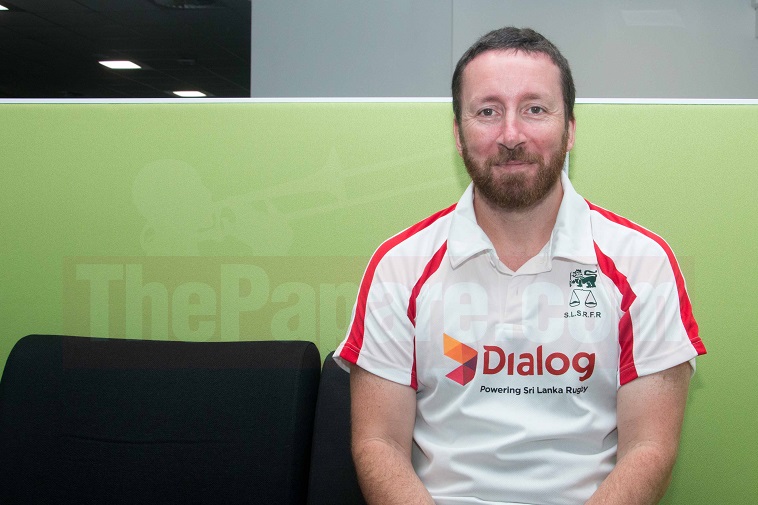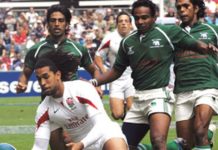Sri Lanka Rugby Football Union’s referee consultant Garratt Williamson is back in the island working extensively with the rugby referees in a bid to uplift the refereeing standards in the country.
Garratt, a former IRB international referee from New Zealand has been working with the Sri Lanka Rugby Football Union since last year contributing his expertise in an attempt to get Sri Lankan refereeing on par with the world.
Spectators lashing out and booing a referee in a rugby match is part and parcel of Sri Lanka Rugby. Blaming the referees for most losses, seem common practice. The referees who already have a thankless job on their hands are put under more pressure than they need to carry and their best efforts may be shadowed as a result. This is a paradox as the Sri Lanka Rugby Football Union finds it impossible to recruit referees and in the end the poor turnout leads to a further drop in the quality of refereeing.
Taking all of this into account, ThePapare.com spent some time speaking with Garratt Williamson himself to delve into issues and get a firsthand account of the progress he and the referees have made.
Q: How have the referees been responding so far?
The response has been good so far, when I came in December I challenged them individually and as a team. I got feedback from the referee coaches and the referees and found where we need to start. Few of the referees were struggling but the rest have been responding well. We saw some young talent in our referees and that’s great.
Q: What about the new recruits?
We initially challenged the schools to find us referees because out of the school boys only 5% end up playing for a club and the remaining 95% go to waste. They actually can step up and take up refereeing and the referee is the one who has the best seat in the house and it is a way to stay fit.
I hear refereeing in Sri Lanka can be challenging because there is heavy criticism in the country but our new system has made progress, the schools and the coaches have been quite supportive.
Q: So far in your stint with Sri Lankan rugby, what are the positives you have seen?
I see development every day, earlier the referees used to defend their mistakes but they now accept their mistakes, like they are happy to put their hands up and accept their mistake while asking for help on how to correct them. That is a huge step for us from the time I first came. They were very defensive at the start but now they open up and express themselves.
Q: How do you plan to educate the schoolboys and the coaches on the law through the referees?
We have lots of opportunities to help out the coaches and the schoolboys. There are various tests in the World Rugby site to test your knowledge on the rules. We intend to go to schools and educate them about the rules, not to see whether they are right or wrong but to educate them in what they lack so they can get their knowledge prepped up. Everyone loves a game with few penalties and little stoppages.
Q: What are the value additions you have brought into the system?
I think the game has changed and the players have become more supportive to the referees and I hope we can take this to the Dialog Club Rugby League and let the coaches be aware of it. I believe this will help both sides.
Q: How have you seen to the fitness aspect of the referees?
Fitness is key in the refereeing and here in Sri Lanka we use the Beep test and we have a number of international referees who have performed in the fitness tests and few of the young referees have set a new standard in fitness which is actually great and fitness is of course a mandatory part to professionalism.
Q: How have the programmes for the new referees come through?
We’ve had a series of workshops coming through both in Kandy and Colombo and had several new guys taking to refereeing. We had two schoolboys from Kandy who came in knowing nothing and in a matter of two hours they looked professional coaching material.
Q: What is your main assignment in your visit this time?
The main aim for me was the fitness, we had the beep test last week and I am hoping to have the another run this coming week and I intend to have five test in the coming months. They will need to pass 2 out of the five tests. In Sri Lanka there is a break between the two rugby seasons and the referees need to stay fit. If they pass two, they will obviously pass all five. Even Olympic athletes peak at a certain time so I don’t expect everyone to pass all of them.
Q: What is your say on the referee’s on-field communication?
We have worked on giving the referees some prep time and increasing their strategic side when it comes to games. We have focused on referee communication and the scrum primarily. When referees talk on the field saying “leave it leave it” they are not thinking of what they are saying, they are restricting themselves. So I have challenged the referees to say nothing at all.
You will see some changes in the Dialog A Division league of Sri Lanka Rugby. When they shout out instructions they see only on what they are shouting and not the rest. But at some places referees do need to talk. For example in the maul and if he needs to get the maul restarted, he needs to voice out.
Here in Sri Lanka, the majority of them speak Sinhalese so I feel it is completely normal for a referee to converse in Sinhalese so both ends meet.
Q: How do you intend to rectify the mistakes and bring Sri Lanka refereeing to international standard?
Coaching is all about seeing where you are now and where you want to be and it is a matter of building the steps to that place. All we need to do is to work on the mistakes we have and try to analyse them to see what went wrong and correct them and over time the referee improves. After we work on a few and rectified their mistakes, we can move on and find another couple of them to work with.
We have a system where teams can contact us within 48 hours after the game to clarify on the decisions of the game. I don’t like clarifications on ‘knock on’s here’ and knock on there but to clarify matters such as “we got the same infringement five times but the decision by the referee was different”.
Q: Where do you see Sri Lanka in comparison to the international standards?
I think we have come a long way from where we were and where we are at present. We are still not on the international level but if we act according to this plan and implement the protocol, I believe we can reach the International standard very soon. We already have international level referees in the country so sooner or later this can be achieved. That is my visio.
























